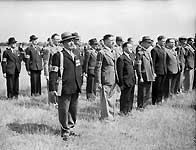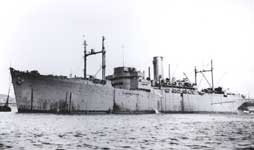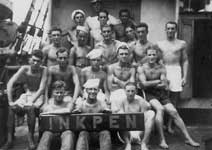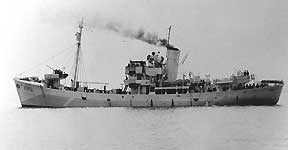| From Dad's Army to the Royal Navy |
|
By the summer of 1943 I was eighteen and after spending eighteen months in the Home Guard and with it, moments like those portrayed in the television series "Dad's Army", I was due for "calling" to the armed forces. I volunteered for the Royal Navy as this was my best chance to follow my trade as an electrician. I was told to report to Chatham Barracks for square bashing etc., then to Eastbourne Electrical College for an RN course which I completed in time for Xmas end of training leave.
 |
 |
|
 |
| |
| Local Defence Volunteers 1939. These men later became the Home Guard (IWM) |
|
HMS Philoctetes - sometimes called by those who had to stay on her as 'The Flock Of Fleas' due to the appaling conditions! |
On returning from leave I was drafted to Lowestoft and then on to Liverpool for troopship to Freetown on the West Coast of Africa. Freetown was one of the main ports of call on the convoy route to the Far East, having a large natural harbour with a large Royal Navy presence, depot ship HMS Philoctetes, Barrack at King Tomand Kissy with workshops, stores, and fueling of both coal and oil.
Freetown was not much of a town to go ashore (see Freetown poem), but there was a fine beach at Lumley with a virgin pool?? Plenty of Canadian larger and film shows at the Navy canteen. For a few weeks I was at the Kissy Workshop on maintenance, repairing the fairy lights round the Officers' Club, but was then drafted to HMS Verity for passage to Takadodri to join HMT Inkpen.
"A crew that looked like a bunch of Pirates!"
What sort of war ship had joined! It burnt coal, did about 10 knots, had a crew that looked like a bunch of pirates, and I had to sleep on a camp bed as there was not enough bunks. But on this small ship I was to learn all about seamanship taking a turn at the wheel, masthead lookout, hoist ash from the stokehole, at action stations was on the starboard light depthcharger thrower - to name just a few duties.
At Takadori there was a large RAF airbase for air patrols along the coast. Also, aircraft were unloaded from ship and then flown across Africa to the war in the Western Desert. They had a very good cinema which was open to us and one evening the Senior Naval Officer left his very large staff car parked outside. Some person, or persons, must have taken offence at this and promptly urinated on it and, it being a very hot night, left it smelling a bit strong. The next morning all ranks of all services, RAF, Army and Navy, were paraded before their respective Commanding Officers and asked individually "Did you piss on the NIC's motor?" We all said "No Sir", but I bet there were some Patrol Service Stokers from a certain HMT who would have carried out this lark
 |
 |
|
 |
| |
| HMS Inkpen's crew photographed while the trawler was based at Freetown, West Africa |
|
HMS Inkpen - one of the eight large Admiralty purpose built 'Hills Class' armed A/S trawlers |
U547 sinks HMS Birdlip and the freighter Saint Basile
It was the job of HM Trawlers to escort merchant ships along the coast between Freetown and Takadori and carry out screening when they were loading at various small ports. On the night of 13th June, 1944 the trawlers Birdlip, Turcoman and Inkpen were escorting the French merchant ship Saint Basile along the coast to Freetown when a U-boat fired a torpedo spread which struck both the Birdlip and Saint Basile. Both ships went down.
Our 12 pounder gun began to fire star shells but there was no siting of the U-boat which had the possible surface speed of 18 knots. I was detailed to remain for the rest of the night at the stern depthcharge thrower position and at first light we picked up the survivors from the Saint Basile. The survivors of the Birdlip got ashore as we were quite close to the coast.
"The delights of the Rue Rafenel!"
A few days later the AS whaler, Southern Pride, which was to support the hunt for the U-boat, went aground and was lost.
The French Senagal Port of Dakar was now in Free French control and was being used by the Royal Navy for repairs and maintenance of ships as it had excellent workshops and a dry dock. We were very lucky to be sent there and the Inkpen was in dry dock having her bottom cleaned and painted about the time that Paris was liberated. We all took advantage of the French great joy and hospitality at the local Foyer de la Resistance (Canteen of the Forces). and the Inkpen was time that Paris was Dakar was a very modern town and port but some of it was '.Out of bounds" to us, including a famous and very popular bar in a street called the 'Rue Rafenel' which was regularly raided by the Naval Shore Patrols. While at Dakar a small US Aircraft Carrier docked with five supporting Frigates which were the latest hunter/killer group. "Have you guy's seen any U-boats?" we were asked. The Yanks were not allowed ashore and did not taste the delights of the "Rue Rafenel but they did invite us to a film show on one of their ships.They sailed after a couple of days.
"Our three African stokers looked more like Red Indians!"
The crew of the Inkpen included, three West African stokers who were not allowed to bunk in the crews' messdeck and had to sleep in a small compartment right aft above the tiller. They used to cook their own food which seemed to consist of a lot of rice and dried fish but for a treat they were given two large tins of herrings in tomato sauce. We were at sea a little before dusk when there was one hell of a bang, alarm bells sounded and we leapt to our action stations. There appeared to be nobody shooting at us, no damage aft, and we did not seem to be sinking. Our three West African stokers had put the ·tins of "herrings in" in the galley oven without opening the tins, which promptly exploded as they got hot. The galley door had been blown open and the bulkheads were covered with a sause mix of herring and tomato including our three stokers looking more like Red Indians than Africans! Fortunately, everyone did see the funny side to this incident.
Decorated for their bravery
There was a Navy Rest Camp at Cape Coast Castle at a disused airfield, south down the coast from Takadori where ship companies halfway through a 12 month tour, were sent for three days leave. Great food, drink and no duties. There was a wonderful sandy beach and we were able to borrow 303 Lea Enfield rifles for some rough shooting, but the only game about was Kitehawks who seemed to lead a charmed life. Trawlers were not the smallest ships operating from Freetown as there was a number of M.L.s (motor launches) which carried a small number of depth charges and 20mm guns. The Inkpen was at anchor in Freetown. We had just finished dinner when some local firing was heard and we all rushed to the upper deck. About three M.L.s were anchored together and there had been some accident with petrol in the engine room which caught fire and spread to the upper deck 20mm ammo exploding. Was it not for the action by some of the crew and a passing picket boat, there would have been a major disaster as this fire could have spread to the depth chargers, or they may have exploded when the ships sank. We could only watch as men on the M.L.s pulled the primers from the charge and released mooring lines for the sister ships as the picket boat attempted to pull the burning M.L. clear. The M.L. did sink, but the men who carried out the brave acts were later decorated.
A tragedy was to touch the crew of the Inkpen when Able Seaman Jarvis (I think that was his name), was called to see our Captain who had to break the news to him that a V2 rocket had wiped out his family in London and he was immediately flown home.
HMS Finisterre then out the gates to civvy street
My return came in April 1945 and I sailed home on the Highland Monarch. After leave I regret I was returned to Clubhouse for general service with a draft to join the new Battle Class Destroyer HMS Finisterre at Greenock. After trials, the Finisterre sailed "working up" on its way to the Far East war, calling at Gibraltar, Malta, Alexandria, Aden, Colombo, Singapore, Hong Kong and Shanghai as the war had now ended.
My demob number came up so I was to sail home on the Troopship Strathmore to Chatham Barracks and out the gate to civvy street. I was lucky in my short service in the Royal Na\ry and to serve when the men who had been at sea from 1939 before the war turned in our favour. I hope some of them are still around like my old shipmate Emie Crowther who was the Coder on HMT Inkpen. Unfortunately my old friend Fred Godfrey, who was in training at Chatham with me, and joined HMT Pict, passed away a few years ago.
SIERRA LEONE
They shipped me abroad, but not quite alone
With other poor sods, to Sierra Leone
It's the grave of the White Man,
Y'on free sir to own
But I'm too tough sir to die in Sierra Leone
Now Sierra Leone sits is a hell of a place
And the way that you're treated is a bloody disgrace
At 6 in the morning you're dragged from your bed
By 6 in the evening you're bloody near dead.
There's a dump called Freetown, you'll soon sir see why
If you give sweet dam all for it, it's too blasted high
It's the first place you see sir when you come thru' the boot
If you never see it again sir, it's too blasted soon.
There "SKEETERS" and crocodiles, snakes green and black
And blasted big scorpions that climb down your back
There are leopards and lizards and Jigger flies too
It would shock you to know what a Jigger can do.
If you've got the idea sir that Africa calls
Just look for your romance sir, round old CHARLOT FALLS
The sights that you see there would give you the pip
And send you high tailing it back to the ship
If they ship me again sir my sins turn to stone
For God's sake don't make it SIERRA LEONE
After all that I've seen sir I'd far rather be
Where I can sit without thinking of Dysentry
Geof Bewers 2000
|